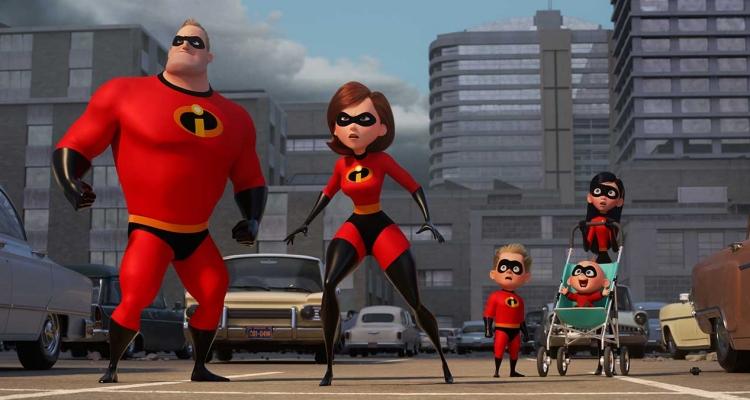For the past 14 years writer/director Brad Bird has had to endure one question more than any other: When was he going to make a sequel to his animated superhero romp “The Incredibles?” Well, a few years ago Pixar let it slip that he was hard at work on the follow-up and, after the production of “Toy Story 4” went through some creative shuffling, the release date was bumped forward by a whole year. In animated movie terms, this shortening could have spelled doom. Instead, Bird and his team seem to have flourished, delivering one of the most thoughtfully entertaining studio movies in ages.
READ MORE: ‘Incredibles 2’ Is An Animated Blast & Improves On The Beloved Pixar Original [Review]
“Incredibles 2” hinges around an ingenious role reversal; instead of going out and thwarting evil, Mr. Incredible nee Bob Parr (Craig T. Nelson) is tasked with staying at home while his wife Helen aka Elastigirl (Holly Hunter) is off fighting crime. From there, an elaborate and thematically resonate story blossoms that is just as heartfelt and eye-popping as the last movie, and in some cases even more dazzling.
Late last week, we chatted with Bird about what it took to pull “Incredibles 2” together, if his philosophy towards sequels had changed at all, his aborted plans for a “Tomorrowland” franchise, and what’s going on with “1906,” his earthquake epic based on the 2004 novel by James Dalessandro.
You’ve directed a sequel in another franchise that you didn’t create (“Mission: Impossible – Ghost Protocol”), were offered a “Star Wars” sequel, made a movie that was supposed to spawn sequels (“Tomorrowland”) and now are directing a sequel to a movie you did make. I was wondering if your philosophy towards sequels has changed or evolved.
I think it’s different if you’re doing a sequel to your own work. That’s absolutely different. People often make snap judgments based on a sound bite and they think I am anti-sequel. And I’m not – clearly. I’ve done two and several of my favorite movies are sequels. I love “The Empire Strikes Back” and “Goldfinger” is the best Bond I think and “The Road Warrior” is fantastic and “Terminator 2” and “Godfather Part II.” There’s a lot of them. But I think that we’re in a period now where the only big films with the exception of Christopher Nolan are sequels and remakes and reboots and reheated food. We have a kitchen. We have cooks. We don’t have to take the last decade’s meals and keep reheating them and pretend those are the only things that succeed.
So I think that these films can be wonderful – and like I said many of my favorite movies are – but I think there’s a danger when so much creative bandwidth is taken up with repeating ourselves. And it seems like sometimes it’s the only thing people ask from us or want from us anymore. I constantly hear “how about a sequel to this or that?” And it’s like “remember originals? ‘Star Wars’ was an original once! ‘E.T.‘ was an original! Wasn’t that cool?” And I don’t want us to forget that.
Was the intent with “Tomorrowland” to create a new franchise?
I think maybe Damon [Lindelof] and I had in mind, and this might be the anti-franchise idea because the world was so big you could do a bunch of different films and have them overlap a little bit but have completely different characters in every movie. And have them be part of an elaborate story. But the first film didn’t pan out. So there goes that idea. But it was trying to be a bunch of originals in disguise as sequels. People feel much more confident giving the green light to sequels than they do to originals.

